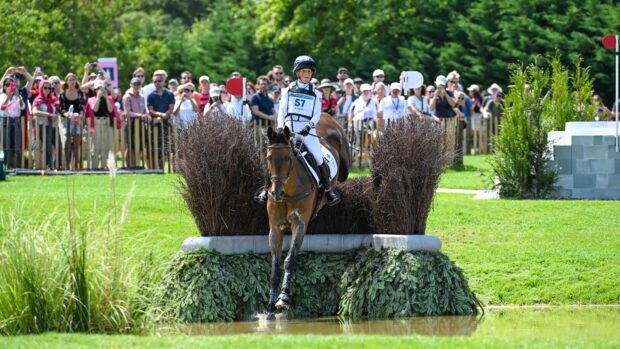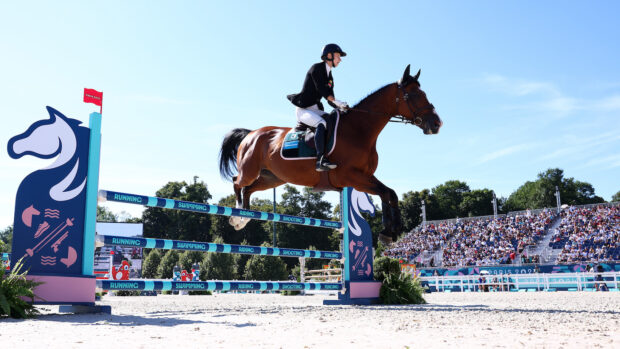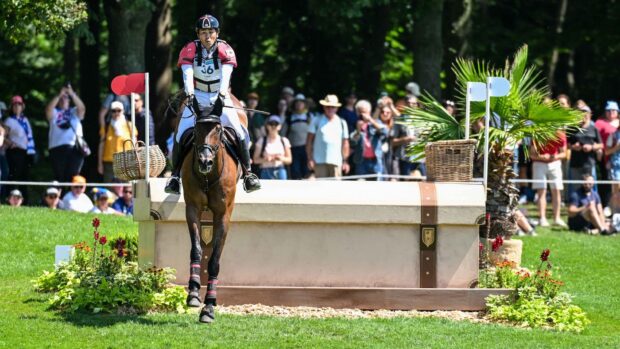A woman who was born with her stomach outside her body has gone on to prove a medical condition need not stand in the way of a career with horses.
Abi Hitchcock, who has no abdominal oblique muscles, defied doctors’ advice to enjoy her hobby, which later turned into a full-time job.
In a varied career, Abi has worked with racehorses, show horses, driving horses and drays and become a BHSAI, western instructor and carriage driving coach. She also featured in the TV series Katie Price’s Pony Club and worked for the British team.
Born with the condition exomphalos, Abi spent the first eight years of her life undergoing a number of operations, and was not able to start riding until she was ten.
“It definitely held me back and I had to have a year or two after the surgeries to allow things to settle,” she recalled. “I had open scar tissue until I was eight and there were points where I was wrapped in cling film and had to stay in a sterile environment.”
While she was encouraged to swim and take ballet classes to improve her muscle tone, riding was a sport doctors considered off-limits.
“I wasn’t supposed to do it and my dad wasn’t keen,” she said, “but there was a lady near school who needed a hand with a riding pony.”
Even taking a few heavy falls early on did nothing to deter her from her passion.
“I wasn’t bothered by the risk when I was younger, I rode anything and everything, got ponies from the sales, broke them in and got them going and didn’t think twice.
“I think the main thing from the doctors’ point of view was to always wear a body protector and I have — because there is no muscle over my stomach, even a horse nudging me can cause a lot of pain.”
While Abi’s condition has some physical limitations, it did not deter her from shouldering a heavy workload and she only ever had four days off in a long equestrian career — “and three of those were because of a fall”.
“I’ve driven commercially and worked for draymen, moving barrels,” she said. “I’ve done plenty of riding in my jobs and sometimes ridden six or seven horses a day.”
Initially planning on a career in teaching, in a last-minute change of plan Abi ditched her A-levels and applied to work on a racing yard in Herefordshire.
“I got into it by accident really – I chose the job because I could go to the interview on a Friday and start work on the Monday,” she said.
She found riding racehorses on the gallops quite physically demanding.
“I’ve had to have horses go a certain way for me, I can’t have them sit on me and I can’t have that pull on me. With the racehorses I used to take just the one lot up the gallops and then school three lots,” she explained.
“All my horses have had to be light in hand and although I did event, I couldn’t really have been competitive at it. I would have struggled with pure dressage at the higher levels too. Because I’ve got no abdominal obliques, my back takes the strain of everything.”
Abi added that her employers had generally been accommodating over the years.
“When I worked for Jeff Osborne [carriage, scurry driver and equestrian sponsor] his [head girl] Alison Tucker was very good and looked at ways to keep me comfortable. They had a lot of show horses in at that time, so I had to ride a few but then I’d drive others,” she said.
Abi also found other ways to adapt, taking up Western and also being heavily involved in carriage driving as both a competitor and backstepper.
“I found it was the rising trot that aggravated my back, so I got into western where I could ride with a lot less tension and without horses being heavy,” she said. “With the driving, I liked that I could compete on an even keel with people.”
Abi’s advice to others who may have medical conditions getting in the way of riding is to heed doctors’ advice.
“Take any precautions you can,” she added. “And if what you’re doing isn’t working it doesn’t necessarily mean you have to stop altogether — there may be alternatives that are more acceptable.
“Once the hospital realised that I wasn’t going to give up riding, they made me a back support which was very helpful.”
Abi also advised that it is important to be upfront with people about any medical problems you might have.
“I don’t play up my abilities if I am riding somewhere else as I don’t want to be put on an idiot!” she said. “As a riding instructor I’m also aware that it’s important to make other people aware of a problem.

Claire Lomas nominated for inspiration award
Claire Lomas has been nominated as an "inspirational fundraiser" at this year's Inspiration Awards for Women

Rider loses 10 stone to get back in the saddle
“I knew I had to get the weight off and riding was my inspiration”
“If I’m accompanying someone who has come off in a field, if I don’t think it’s a bad issue I’m not going to rush for an air ambulance but if I know they are on blood thinners, for example, I might take a more extreme response if there’s a risk they’ll bleed out.”
Back pain finally led Abi to give up her equestrian job a year-and-a-half ago and she has recently taken on a new career as a railway signalman. But she does not plan to stay away from horses for too long.
“I’ve been driving recently and it made me realise quite how much I am missing it,” she said. “I’m hoping to get myself sorted out and get back to it.”
For all the latest news analysis, competition reports, interviews, features and much more, don’t miss Horse & Hound magazine, on sale every Thursday





